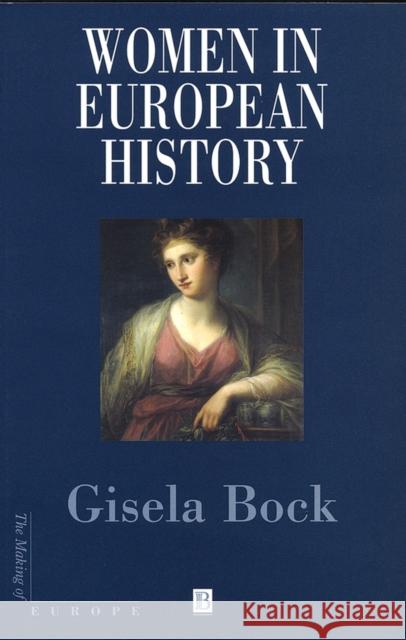Women in European History » książka



Women in European History
ISBN-13: 9780631191452 / Angielski / Miękka / 2002 / 316 str.
Women in European History
ISBN-13: 9780631191452 / Angielski / Miękka / 2002 / 316 str.
(netto: 220,70 VAT: 5%)
Najniższa cena z 30 dni: 228,91
ok. 30 dni roboczych.
Darmowa dostawa!
This book illustrates the social, cultural, legal and, political conditions that European women have faced from the Middle Ages to the present day.
Wydanie ilustrowane
"Bock looks at issues such as marriage, women′s roles in the French and Industrial Revolutions, the nature and definition of the family, women and the welfare state, the Nazi regime, and the women′s movements in the nineteenth and twentieth centuries. The book succeeds in synthesizing a substantial amount of comparative gender and cultural history over a considerable time span. And to Bock′s credit, she strikes a good balance between factual information and biography... there is much food for thought"
Lori Williamson, Open University <!––end––>
"Bock offers interesting insights into class, race, and gender...Her treatment of the divisive legislation is sophisticated and nuanced." Mary Kinnear, University of Manitoba – Canadian Journal of History
"... A welcome addition to ... women′s history in Europe.This is a stimulating book." Reviews
Series Editor s Preface vii
Preface ix
1 Querelle des femmes: A European Gender Dispute 1
The Dignity of Man and the Dignity of Woman 2
Misogamy and Misogyny; Philogamy and Philogyny 14
The Power of Fathers, the Power of Men, the Power of Women 27
2 The French Revolution: The Dispute is Resumed 32
Hopes 33
Rights of Man and Rights of Woman 41
Amazons and Counter–revolutionaries 55
Napoleon and the Revolution in Europe 62
Nocturnal Intrigues 78
3 Challenging Boundaries: A Third Gender Dispute 82
Changing Debates and Language 84
No Angels in the House: Ideals and Realities 93
Old and New Labour 99
Pre–Pioneers and Pioneers of the Women s Movement 108
A Social Movement 116
4 From the Social to the Political 127
National and Transnational Movements 128
Equal because Different: The Political Discourse of Suffragism 137
First–comers and Late–comers: European Paths to Women s Suffrage 145
Citizenship and Mother s Rights 156
Social Policies for and against Women 168
5 Between Extremes 174
Female Citizens and the New Woman 175
Maternity and Paternity in the Welfare State 181
Paths Leading to Dictatorship: The Political and the Private 189
National Socialism and Race Policy 206
War and Genocide in Europe 218
6 Civil, Political and Social Rights: A New Gender Debate 233
Liberty and Equality 235
The Longest Revolution 245
History, Mind and Gender 256
Notes 265
Bibliography 280
Index 291
Gisela Bock is Professor of Western European History at the Free University of Berlin. She has published numerous books and articles on the history of women, including studies on gender relations in the modern welfare states, female poverty, women under National Socialism, and the European debates on gender relations.
Allison Brown has been a freelance translator of scholarly books and essays, largely in the fields of history and the social and political sciences, especially women′s and cultural studies, since 1988. She has studied linguistics and German studies, and has an M.A. in translation science.
Women in European History illustrates the social, cultural, legal and, political conditions that European women have faced from the Middle Ages to the present day. It also explores women′s ideas and ideals, their perceptions of the relations between the sexes and their struggle for civil, political, and social rights.
The book covers the long–standing European debate on gender relations and the roles of the sexes in society, which ultimately also posed the question of what is humanity. The study spans, among other topics, changes in marriage over centuries, women′s role in the French Revolution and the Industrial Revolution, gender relations in the European welfare states, the European dictatorships and Nazi racism and the women′s movements in the nineteenth and twentieth centuries. The book concludes with an account of the emergence of historiography on women over the past two centuries.
1997-2026 DolnySlask.com Agencja Internetowa
KrainaKsiazek.PL - Księgarnia Internetowa









